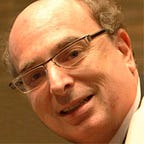How My Father’s Educational Philosophy May Have Unconsciously Shaped My Own
In my classes at Columbia and NYU, I often recite something I once read in a pop culture book called the Celestine Prophesy (ok, the only thing I got from the book): that we sometimes find ourselves fulfilling the unfulfilled goals of our parents. This notion has stayed with me throughout my career. I’ll couple this with a personal thought that there’s usually no win in occupying exactly the same lane as a parent.
For 35 years, my dad taught Shakespeare, Bible as Literature, and Greek drama at my high school. I was prohibited from taking his classes, so my glimpses into his classroom from the hallway and his extensive library in our attic were my only windows into his deep dedication to the humanities.
A few curious contrasts:
My dad taught grammar and language, while I use drawings and cartoons to communicate. He illuminated the serious works of English and American poets; I collaborated with Henry Beard on whimsical “French for Cats” and “Advanced French for Exceptional Cats” books. He played songs by Simon and Garfunkel and Bob Dylan to enliven literary experiences; I turn to Saul Steinberg, Dr. Seuss, and others to bring conceptual ideas to life. While the humanities were his holy grail, I pursued scientific pastures. My dad taught high school; I teach at the university level.
Causation or correlation, it’s hard to say.
Recently, my daughter Sofie found an article my dad published in 1967 in Sage Journals, titled “The High School Teacher and the Humanities.” His innovative proposal addressed the dominant trend of reinvigorating the humanities curriculum, a timely topic as we approach a potential Renaissance in humanities education with the advent of AI.
His focus was to create a “History of Drama” class for college-bound seniors, providing insight into cultural heritage and the human experience. The class would apply the “care and attention which would ordinarily go into the preparation of a high school musical or dramatic performance.” My teaching aims to give computer science students an innovative mindset to navigate a rapidly changing world. It uses visualization, generative thinking, and human-centered design to move student thinking into a more agile state.
But my greatest source of surprise, was discovering that his course centered around the same pivotal questions I ask my students: Who am I? How did I get here? Where am I going?
In my class, I start with “Who am I anyway, am I my resume?” I ask students to share an early defining moment that has strongly impacted their work-life pursuits. This anchors their work in authenticity. They then complete a passion map, identifying primary and secondary defining moments, skill sets, and external validation. These maps guide their trajectory through their educational journey. Midway through, I offer an “Innovation Mindset Survey” to help students articulate their aspirations and guiding factors.
My dad’s approach to these questions was broader, encompassing the canon of Western dramatic works, and focused more on the “American Opportunity” than individual discovery. As a child immigrant from Russia in 1921, he sought to elevate others by teaching English. Standing on his shoulders, I’ve had the luxury of helping students navigate change and disruption in the rapidly changing world they find themselves in.
Whether there’s a direct link between my father’s pedagogy and my own remains unclear, but there’s a shared commitment to using creative methods to inspire transformative thinking and personal growth. And this continuity of generational wisdom, consciously or unconsciously, appears to shape our educational practices, even as methods and contexts evolve.
Have you felt the desire to go where your parents have never tread? I would love to hear any reflections you have about the transfer of generational learning in your life.
As we embrace innovation and progress in education, let’s remain mindful of the wisdom passed down through generations, ensuring that our use of AI in the classroom enriches and empowers the human experience.
